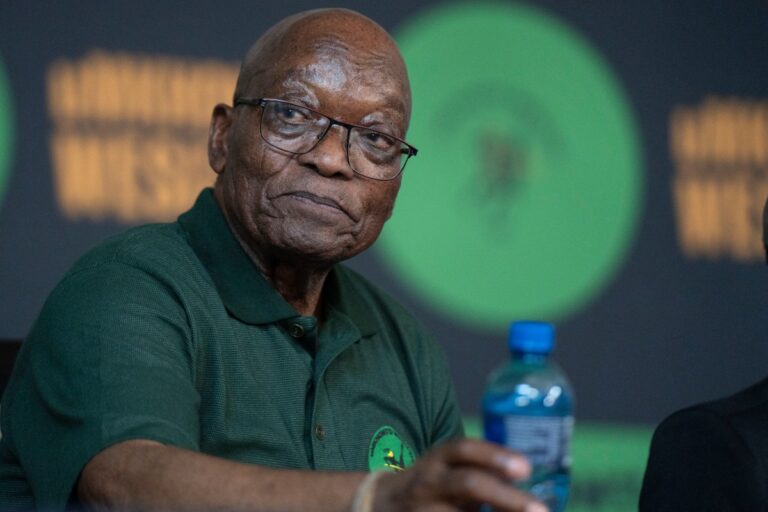South Africa’s highest court heard an appeal on Friday regarding former president Jacob Zuma’s eligibility to stand for office, marking a politically charged legal showdown ahead of the upcoming election.
Zuma, aged 82, is leading uMkhonto we Sizwe (MK), a new opposition party that has emerged as a potential disrupter in the May 29 general ballot.
However, electoral authorities have argued that the corruption-tainted politician should be disqualified from the race due to a 2021 contempt of court conviction.
The Constitutional Court in Johannesburg is tasked with deciding on the matter following a lower court’s ruling in Zuma’s favor in April.
Coming just weeks before what is anticipated to be the most competitive vote since South Africa’s democracy began in 1994, the case has heightened tensions among observers.
Zuma’s imprisonment in 2021 sparked widespread unrest, riots, and looting that resulted in over 350 deaths, raising fears of a recurrence.
“Zuma’s supporters have threatened violence again this year should things not go their way,” said Zakhele Ndlovu, a politics lecturer at the University of KwaZulu-Natal.
Outside the court, a few dozen MK activists, donning the party’s green and black colors, showed their support for Zuma through chants and dances, with some holding signs reading “Vote MK party.”
Inside the courtroom, clad in a blue suit and tie, Zuma sat behind his legal team as they presented their case.
A significant portion of the morning was devoted to debating a request by Zuma’s lawyers for six judges to recuse themselves due to alleged bias. The court ultimately dismissed the application without providing further explanation.
Many in Zuma’s camp perceive the Constitutional Court as biased, the same court that sentenced him to 15 months in prison in 2021 for refusing to testify before a corruption investigation panel. Interestingly, the head of that panel now serves as the court’s chief justice.
The case centers on the interpretation of a constitutional provision barring anyone sentenced to more than 12 months’ imprisonment from serving in parliament, with the ban expiring five years after the completion of the sentence.
The Electoral Commission (IEC) argues that this provision applies to Zuma, while his legal team contends otherwise, citing technicalities in his sentence.
Legal experts anticipate that it may take a few days to reach a final verdict.
Ben Winks, a constitutional law specialist, believes the IEC has a strong case on appeal, highlighting the wording of the constitution.
Zuma’s release on medical parole just two months into his term and the sudden rise of his new party, MK, has added further intrigue to the upcoming election, potentially reshaping the political landscape.
Amidst a struggling economy and allegations of corruption, the ruling African National Congress (ANC), Zuma’s former political home, faces a tough challenge in opinion polls.
The appeal by the IEC seeks clarity to ensure the integrity of the upcoming elections, where South Africans are tasked with electing a new parliament, which in turn appoints the president.


